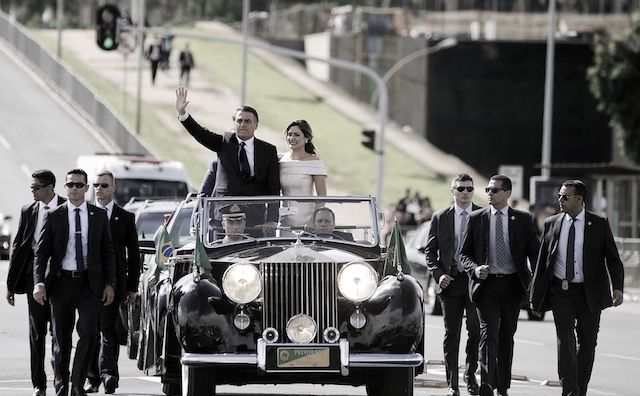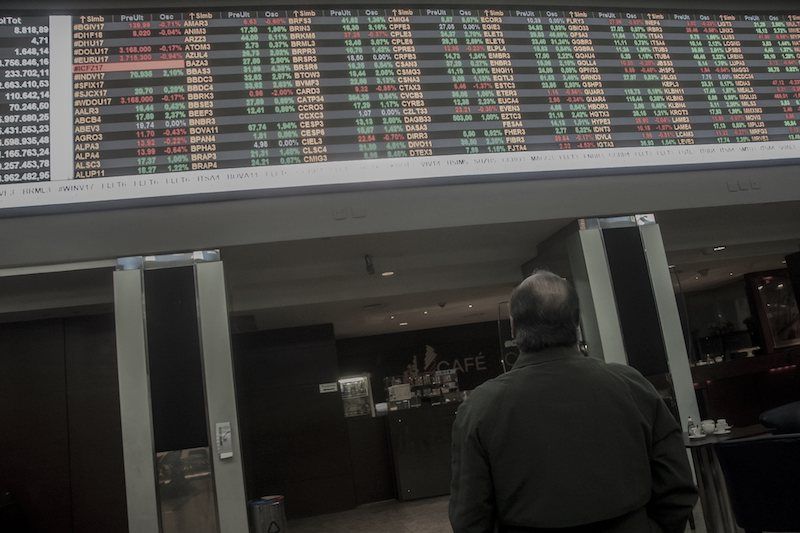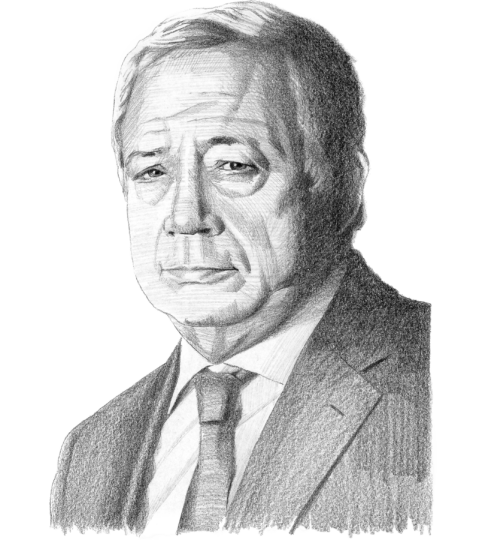How Brazil’s new man got there
Jair Bolsonaro clinched the top job in Brazil by targeting the electorate’s fears, his opponents’ weaknesses, and the need for economic reforms. The new cabinet puts academics, political luminaries, and former military officers in key positions. Bolsonaro faces many challenges, but his program has more merit than many critics want to admit.

In a nutshell
- Jair Bolsonaro won Brazil’s presidency on the strength of antiestablishment sentiment
- Corruption and violence had reached intolerable levels under the previous, left-wing governments
- Brazil has a history of economic prosperity under conservative cabinets, even military regimes
Brazil’s October 2018 presidential election produced a sharp political shift to the “populist” far right, not dissimilar to what has happened in some European countries and the United States. The victory of retired Army Captain Jair Messias Bolsonaro (63) in the race for the presidency of Latin America’s biggest nation hardly came as a surprise. The pre-election polls put him ahead of all other candidates in the first round of voting.
Many had assumed, however, that once the firebrand antiestablishment candidate was forced into a runoff, opposition forces would combine in a “negative coalition” to defeat him in the second round – just as Marine Le Pen lost to Emmanuel Macron in France in 2017. But this was not to be. Understanding why Mr. Bolsonaro ultimately prevailed casts light on the root causes of Brazil’s political shift.
The first and foremost cause was Fernando Haddad, Mr. Bolsonaro’s adversary in the second round of the elections. A senior figure of the PT – Partido dos Trabalhadores, or the Workers’ Party – Mr. Haddad faced a very significant negative electorate. Simply put, the winner benefited from a catastrophic decline in the PT’s popularity.
The sheer scale of abuses left many stunned in a country that has been no stranger to big corruption scandals.
The party had ruled in Brazil for nearly 13 years, under the successive presidencies of Luiz Inacio Lula da Silva, known just as Lula (2003-2010), and his protege Dilma Rousseff (2011-2016). During that period, with the acquiescence, participation or silence of both of these leaders, the PT created one of the most extensive and sophisticated networks of fraud and organized kleptocracy ever known. The sheer scale of abuses left many stunned in a country that has been no stranger to corruption scandals.
The antigraft investigation known as “Operacao Lava Jato” (“Operation Car Wash”) led by fearless magistrate Judge Sergio Moro produced indictments of scores of important Brazilian figures, including some of the country’s best-known politicians and business leaders. Among the beneficiaries of the corruption network was former President Lula. Political responsibility for the seemingly endless series of scandals rested firmly with the PT administration.
This criminal network was a textbook case of money for political favors. Mr. Lula, for his part, received a luxury apartment in a fashionable resort. His electorate had to watch the immensely popular leader, once regarded as a person above reproach, being investigated, charged and sentenced to a long prison term. Despite his incarceration, Mr. Lula announced his candidacy for the 2018 presidential race. The country’s Superior Electoral Court finally disqualified him, but before that the disgraced former president had led in the polls, scoring 39 percent of support a month before the presidential election’s first round.
The PT’s image was tarnished by other financial scandals as well. Mr. Haddad lost to Mr. Bolsonaro because most Brazilian voters could no longer accept the status quo and perceived the PT candidate as a stand-in for Mr. Lula.
Crime and insecurity
There were other reasons for Mr. Bolsonaro’s success besides the PT’s tarnished image. Brazil currently suffers from extremely high crime rates, making it one of the most dangerous places in the world. In 2017, more than 64,000 homicides were reported in the country – more than 175 per day. Such a level of violence and insecurity is intolerable to any community.
Mr. Bolsonaro was clear in denouncing corruption and in his commitment to tackling crime, including its most deadly, organized forms. He took a tough stance, promising legislation to give police more freedom to fight street gangs and pledging to relax firearms restrictions for law-abiding citizens.
Also important was the ubiquity of religious and patriotic pronouncements in his campaign rhetoric. The candidate adamantly rejected all forms of political correctness for allegedly contravening these underlying values. At one point, the frenzy of his opponents led to an attempt on his life. Stabbed in the abdomen, Mr. Bolsonaro barely paused his campaigning, resorting to social media tools when he could not leave his house.
During the two decades of military rule Brazil experienced a period of economic prosperity and social development.
If a substantial part of the electorate opted for Mr. Bolsonaro because they wanted to get rid of the PT, others voted for his national-conservative agenda. His liberal, pro-market stance on the economy was softened with frequent calls for social justice that resonated widely in the Brazilian society. To identify Mr. Bolsonaro’s constituency, one has to recognize the sources of his political appeal.
1. Patriotism
Brazil has a robust nationalist tradition, both to the right and left of the political spectrum. Mr. Bolsonaro very astutely mobilized this part of the electorate. The military is also important to the Brazilians, given that the army has always been perceived as an arbiter in the country’s political system, occasionally intervening in it directly. The last such time was in the mid-1960s, when the army pushed out President Joao Goulart (1961-1964), a left-wing reformer considered to be too radical for the presidency. That inaugurated a military regime that lasted for more than 20 years.
The military regime later had to fight urban guerrillas. The repressions that resulted were harsh, though the estimated total of 400 to 500 opponents killed was significantly less murderous than in Chile and Argentina.
During the two decades of military rule, however, Brazil experienced a period of economic prosperity and social development. During its second wave of industrialization, the country’s infrastructure was modernized and expanded, and the living standards of working and middle classes improved markedly. This was the time of “the Brazilian Miracle,” which lasted until the first oil shock hit in 1973.
2. Angry professionals
Throughout the PT’s decade and a half in power, the leftist party developed an economic model financed by deficit spending and rising taxes, mostly at the expense of the business community and the middle class. As a result, the country’s debt soared and its economic development was stunted. Mr. Bolsonaro’s advocacy of economic liberalism and free markets thus resonated with professionals and members of the middle class. The candidate, who made no secret of his personal ignorance of economics during the campaign reached out to Paulo Guedes (69), an academic and banker, giving him a pivotal role in the new cabinet as minister of economy. Dr. Guedes, who adheres to the University of Chicago school of thought, has unveiled a privatization program to sell off public companies.

3. Religion
Finally, Christian voters, Evangelicals and Roman Catholics, strongly supported Mr. Bolsonaro’s crusade against political correctness and LGBT ideology. The country’s Evangelical and Pentecostal churches have gained much strength in the last four decades, currently making up about 30 percent of Brazil’s Christians. The Protestants are very active and influential in the academic and media sectors, playing a similar role to their counterparts in the U.S.
Fighting fire with fire
Leftist groups and the defeated PT are now proclaiming their determination to fight back against what they deem to be President Bolsonaro’s antidemocratic and even “fascist” ideas. They argue that Brazil’s democracy is in danger. Some critics speak of “resistance” by any means necessary. These groups are receiving support from left and center-right liberals in the international community as well.
This negative propaganda is exaggerated and usually based on intemperate comments made by Mr. Bolsonaro during his 27-year career as a member of parliament. Some are quoted out of context and others are remarks for which Mr. Bolsonaro has already apologized. As with U.S. President Donald Trump, some of the media appears to be obsessed with Mr. Bolsonaro and determined to fight him by any means necessary.
The new team
Mr. Bolsonaro’s cabinet choices, on the other hand, show his resolve to succeed. He has assembled a team with some real stars, including Mr. Guedes and Federal Judge Sergio Moro (46), who gained fame for leading the prosecution in Operation Car Wash. The new president asked the judge to become minister of justice and public security. Other vital posts – nearly a third of the 22 cabinet seats – went to senior military officers. Among their portfolios are defense, intelligence, transport, and science and technology. This group of nominees includes Augusto Heleno (71), a retired army general who as minister for institutional security is said to be the second most important man in government after the president.
The oil industry has occupied a special place in Brazilian politics since the industry was nationalized in 1951.
One of Mr. Bolsonaro’s most important tasks will be striking a balance between his cabinet and his political supporters. For example, the strict economic liberalism of Dr. Guedes may collide with the views of some of his military colleagues, especially when it comes to sales of state-owned companies. The case of Petroleo Brasileiro S.A., known as Petrobras, the state-owned energy giant, will be an interesting test. While the military will likely accept privatization in the refining and downstream parts of the business, they will probably be much less enthusiastic about selling off the upstream operations (exploration and production). The oil industry, in general, has occupied a special place in Brazilian politics since President Getulio Vargas (1930-1945 and 1951-1954) nationalized the industry and created Petrobras as a national champion in 1951.
Another difficult test will take place in Brazil’s hopelessly fragmented legislature, where 30 parties and political groups contend and Mr. Bolsonaro’s Social Liberal Party (PSL) can muster only 52 seats out of 513. The PT is still the biggest party with 56 seats. Passing the president’s program through the National Congress will require complex negotiations and trade-offs to forge working majorities. Nonetheless, the president has 27 years of legislative experience, as he represented the state of Rio de Janeiro in the Chamber of Deputies from 1991 until 2018. For this reason, too, the expectations of his supporters are running high.
Developments to watch
Mr. Bolsonaro cuts a very different figure from the corrupt and inefficient officials in PT-controlled governments. But delivering real change for most Brazilians – first and foremost for his supporters, but also to win over part of the PT’s electorate – will be a tall order for the new administration and its outspoken leader.
The president’s team is expected to start by making the streets of Brazil’s cities and their outlying slums (favelas) safe. This alone will be a tremendous task. The cabinet also needs to deal urgently with the runaway costs of the country’s social security system which have led to a long-term disruption of public finances. In 2017, the system ran a deficit of approximately 270 billion Brazilian reals ($72.77 billion). If expenditures continue on their current trajectory in 2019, this budget item will be higher than the combined outlays for public health, education and security.
Can Mr. Guedes reduce the government’s spending and generate sufficient new income from asset sales? What kind of a balance will emerge in the cabinet between its pro-privatization and (still powerful) protectionist wings? And how can Mr. Bolsonaro find a majority in the National Congress to approve his reforms? The first quarter of 2019 will provide the first insights on whether Brazil’s new president can translate popular legitimacy into effective policies.






